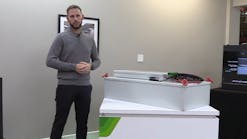Police found martyrdom videos and bomb-making components during the investigation of the alleged plot to blow up U.S.-bound jetliners, prosecutors said Monday in announcing 11 people had been charged with terrorism offenses.
Officials confirmed for the first time that the plot involved the manufacture of explosives, which were to be used to assemble and detonate bombs inside as many as 10 airliners. U.S. officials previously had said the plot appeared to involve mixing liquid-based chemicals to make explosives aboard the aircrafts.
One woman was released from custody Monday and police continued to interrogate 11 others who remain "under active investigation," lead prosecutor Susan Hemming said.
Those charged were scheduled to appear in court Tuesday morning, but because of the seriousness of the accusations, it was unlikely bail would be granted.
The briefing by police and prosecutors lasted less than eight minutes, but provided more information than had been released in the 11 days since the alleged plot was first disclosed and air travel out of Britain was thrown into turmoil.
They said investigators had found bomb-making materials - including hydrogen peroxide and electrical components - and seized more than 400 computers and 200 cell phones in nearly 70 searches.
More than 8,000 items used for data storage, such as compact discs, DVDs and memory sticks, were reported found. Maps of Afghanistan, suicide notes from willing terrorists and books on explosives also were seized, officials said.
"We have also found a number of video recordings - these are sometimes referred to as martyrdom videos," said Assistant Deputy Commissioner Peter Clarke, who heads the Metropolitan Police's anti-terrorism unit. "This has all given us a clearer picture of the alleged plot."
According to dates given by prosecutors, the plot could have begun last year.
The details of the charges against one man, Mehran Hussein, allege he had information that could have prevented a terrorist act and didn't disclose it sometime between Sept. 23, 2005, and Aug. 10, 2006 - the day police announced breaking up the plot.
In all, eight people were charged with conspiracy to commit murder and preparing acts of terrorism. One person, a 17-year-old, was charged with possession of articles that could be used to prepare a terrorist act and two people were charged with failing to disclose information that could help prevent a terrorist act.
Nine of those charged were from London, according to a Bank of England list of suspects whose assets were frozen following the arrests. Two were from High Wycombe, 30 miles northwest of London.
The briefing was also a chance for police to show they were avoiding missteps in previous terror investigations that had arroused considerable public skepticism over their actions. Clarke did not mention two earlier events but pledged that investigators would be diligent.
In June, two brothers were detained in a raid by London police looking for a chemical bomb. One of the men was shot and wounded. No explosives were found and the brothers were released. The incident caused anger in London's Muslim community.
Last year, police killed a Brazilian bystander aboard a subway train after officers mistook him for a suicide bomber following the July 7 bombings that killed 52 people.
Officials at the briefing did not mention links between the alleged plotters and any particular group, and reporters were not allowed to ask questions.
Pakistani authorities have linked several people arrested there in the alleged bomb conspiracy to al-Qaida militants both in Pakistan and in neighboring Afghanistan, where Islamic militants are fighting the U.S.-backed government.
Among those being interrogated in Pakistan is Rashid Rauf, a Briton of Pakistani descent who officials in the South Asian nation say played a key role in the plot. His brother, Tayib, who was videotaped at a grocery story in Birmingham just hours before he was arrested Aug. 10, was not among those charged.
British investigators have until Wednesday to decide how to proceed with the 11 people still held without charges. Police could file charges, release them or ask a judge to grant more time for questioning.
Police said the investigation was "far from complete," saying it would continue for months.
"All the data will be analyzed," Clarke said. "There will be thousands of forensic examinations and comparisons. Fingerprints, DNA, electronic data, handwriting comparisons, chemical analysis and indeed the full range of forensic disciplines will be used."
After British officials announced they had foiled the alleged plot, tighter security was immediately imposed at airports around the world. Passengers were banned from carrying hand luggage and liquids onto planes.
Britain's air transportation network, in particular, was plunged into chaos, with long lines jamming airport terminals and many airline flights canceled. By Sunday, airport officials said the situation was busy but had begun to return to normal.
News stories provided by third parties are not edited by "Site Publication" staff. For suggestions and comments, please click the Contact link at the bottom of this page.





